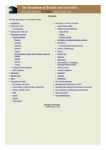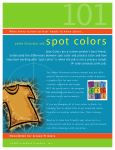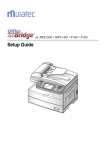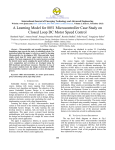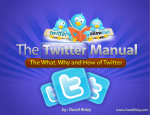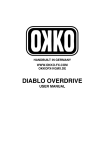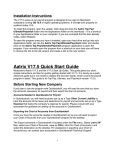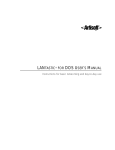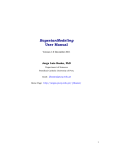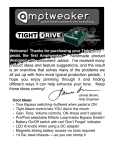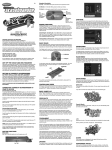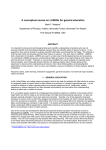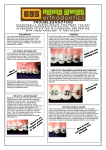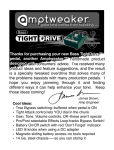Download 14 Widespread Myths about Technical Writing | I`d
Transcript
14 Widespread Myths about Technical Writing | I'd Rather... http://idratherbewriting.com/2008/06/26/myths-myths-myt... 14 Widespread Myths about Technical Writing Jefferson McClure added a thought-provoking article link on WriterRiver.com titled “Myths of Technical Writing.” The arti‐ cle is by Bob Doyle and appears on the dita.xml.org wiki site here. In the article, Doyle and other wiki contributors men‐ tion 4 myths about technical writing: 1. The GlueText Myth 2. The Stem Sentences Myth 3. The Front-Matter Page-Numbering Myth 4. The Callouts on Graphics Myth Youʼll have to read the original for the details. The debunking of these myths is supposed to help you embrace a struc‐ tured authoring methodology like DITA. The myths are genuinely insightful, and it got me thinking about myths in a larger sense. In part, Iʼm reflecting on myths because I was recently invited to speak to students at a professional writing conference at BYU Idaho in the fall with the topic, “Three Myths About Technical Writers.” Apparently, many students pursing English degrees assume technical writers have “sold out.” They think technical writing is a “fallback” career. Itʼs something you can do if youʼre starving and donʼt have any other options. Oh, the financial naivete and idealism … Iʼm not sure what will convince people immersed in Charles Dickens and Edgar Allen Poe and Chaucer and Emily Dick‐ inson, who are writing about deconstructionism and feminism and the intersection of Shakespearian influences on post‐ modern authors, etc., that technical writing is more than just “press this button here to program your VCR…” It will be a challenge, but one worth taking. When I was a student at BYU, I held these same biases against technical writing. I acquired the myths from one presentation by a teacher who represented the English faculty on technical writing. In a nutshell, compared to the other English professors, she was the most boring of any Iʼve ever met — by a long shot. She talked about formatting phone books. I whispered a silent vow to myself that I would never, never become like her. While she spoke of layout and design for banal texts, other professors ignited us with literary ideas. I now have a personal vow to make technical writing look like one of the most appealing careers one could possibly pur‐ sue. In addition to myths about technical writing as a sellout and fallback career, I can think of at least 10 other commonly held myths surrounding the field of technical communication. I offer them below. 1. Technical writers spend most of their time writing. Totally untrue. Most tech writers spend about 10% of their time writing. The rest of their time they spend learning applica‐ tions, noting bugs, providing usability feedback, structuring their content, setting up styles for their help files, trou‐ 1 of 17 10/19/13 11:07 AM 14 Widespread Myths about Technical Writing | I'd Rather... http://idratherbewriting.com/2008/06/26/myths-myths-myt... bleshooting their tools, strategizing help deliverables, training new users, formatting and laying out their content, updat‐ ing existing content, meeting with project team members, and occasionally playing ping pong. 2. You canʼt get a job in technical writing unless you have technical writing samples; but you wonʼt have samples until you have a job in technical writing. Donʼt believe this for an instant. Youʼre surrounded by technology — your iPod, computer, DVD player, microwave, cell phone, BlackBerry, and everything else. Download a trial version of some help authoring tool, or even just open up Mi‐ crosoft Word. Write instructions for something. Find an open source application with poor instructions and rewrite them. You donʼt have to create an entire user manual. Just give your potential employer some evidence of your capability. 3. A technical writer who has years of experience is more knowledgeable than one with fewer years of expe‐ rience. This myth is turning into my pet peeve. How many bios have you seen that begin, “Joe has 15 years of experience …” or “Kate has over 20 years of experience as a technical writer….” Experience means nothing unless learning is taking place. I can go to my same job for 15 years, do the exact same tasks, use the exact same tools, never taking any cre‐ ative risks or moving into new territory, just doing what Iʼm told, or what Iʼve read, for my entire life. The pace of learning can be compressed into a very short time period, or it can drawn out over a life time. The time (years of experience) does not matter as much as the learning that takes place. (See this related post, MySQL CEO Says, “It is dangerous to hire someone with too much experience.”) 4. The tools you know are more important than your industry knowledge. Many job ads say you have to know RoboHelp, Photoshop, CSS, HTML, Javascript, C Sharp, InDesign, Dreamweaver, DITA, XML, XHTML, and so on. But really, if you have strong domain knowledge about an industry, that knowledge can be a lot more powerful than a specific tool. For example, if you work in the financial industry, a Series 7 license (which al‐ lows you to communicate with investors) is a lot more important than RoboHelp. It can take months of study to get your Series 7, and only a few weeks to pick up a tool. (See this related post, Doug Davis on the Job Side of Technical Writing — Location, Industry Experience, and Salary.”) 5. Be careful about having a blog, because all employers google you and will find it. When I hear this, I cringe. The discussion always comes up among non-bloggers who think blogs are a wart you need to hide. Sure if you have an embarrassing MySpace page where you mix profanity with vulgarity and other shady content, thatʼs a site you need to obliterate. But a professional blog demonstrating your knowledge of technical communication can be a powerful tool for getting an edge on other job candidates. It can also serve as a tool for professional develop‐ ment and keep you enthusiastic about your career. 6. Technical writing academics are disconnected with the profession and only have a tenuous idea about the actual practice of technical writing. Many academics started out as technical writers and worked for years doing the same things we did. Are we practition‐ ers so vain that we think the industry is rapidly changing from year to year, so much so that intelligent people who spend years immersed in texts, studies, journals, and experiments have no idea what our jobs involve? Academics may not be totally fluent with the latest tools, but that doesnʼt mean theyʼre disconnected with technical writing practices and chal‐ lenges. (See this related post, “Reflections on Allison Reynoldʼs Talk on Job Skills for the Workplace.”) 7. You canʼt have voice or style in technical writing. It has to be objective. And the fewer contractions, the 2 of 17 10/19/13 11:07 AM 14 Widespread Myths about Technical Writing | I'd Rather... http://idratherbewriting.com/2008/06/26/myths-myths-myt... better. All writing has voice. You donʼt have to remove all sense of humanity from your writing. A writer who uses contractions, moves toward conversational style, and truly has voice will provide a better experience for the frustrated user who seeks human help rather than cold robotic formalese. The talk that changed me forever was this keynote by Kathy Sierra at SXSW, where she explains the need for human qualities in help material when users, in desperate frustration, finally click the help button. If you want to sound like a robot, eliminate all contractions from your writing. What tone do you think users respond better to? 8. Technical writers arenʼt allowed to contact users directly. They should get their information through the product manager, customer support, and marketing. Here we see yet another wrong idea that will only put up roadblocks for worthwhile help. Joe Sokohl clarified this princi‐ ple at Doc Train West 2008, calling it the Kobayashi Maru principle (a reference from Star Trek). He says you have to throw aside the idea that you canʼt contact users. Without this contact and the information you can gather from users, youʼre hopelessly doomed to write instructional material they donʼt want. 9. You can single source your material into all the formats your audience needs, if you just learn the right tool or technology. When you learn to structure your content with DITA, you can magically transform all your content into every format your users need. NOT. The type of instructions you write for a one page quick reference guide varies from the kind of style you need for an iPhone or for a long manual. While I agree that you can single source online help to a software manual, the idea gets taken too far. (See this related post by Gordon McLean, “DITA Is Not the Answer.”) 10. You have to be quite tech-savvy to be a good technical writer. Actually, when you become so tech savvy that you canʼt imagine users not understanding how to disable a popup blocker or not knowing how to do a simple task, when you are stunned at users who double-click when they should single-click, or who single-click when they should double-click, at this point, you lose some ability to write for the lowest common de‐ nominator. Itʼs not such a bad thing if youʼre technically challenged. So are most of your users! Youʼll be on a level play‐ ing field and will probably write a help manual that actually speaks their language. (See this related post, “The Curse of Knowledge — The More You Know, the Worse You Become at Communicating that Knowledge.”) 1 Tweet 10 4 3 of 17 10/19/13 11:07 AM 14 Widespread Myths about Technical Writing | I'd Rather... http://idratherbewriting.com/2008/06/26/myths-myths-myt... 10 Like 3 0 2 Related Posts Online Anonymous Rating Sites: Empowering Individual Voices Becoming a Writer — Reflections on a Trip to Idaho Podcast: Debunking the Boredom Myth of Technical Writing Choosing Between Academic and Corporate Life: Did I Make the Wrong Choice? From DITA to VITA: Tracing Origins and Projecting the Future This entry was posted in Blog and tagged false concepts, myths, Technical Writing on June 26, 2008 [http://idratherbe‐ writing.com/2008/06/26/myths-myths-myths-about-technical-writing/] . By Tom Johnson A little more info about me ... I'm a technical writer working for a gamification company in the San Francisco Bay Area. I'm primarily interested in content, findability, and visual communication -- all essential topics in technical communication. I blog pretty regularly here -- about 3 times a week. Subscribe to my blog if you want to stay updated with new posts. Feel free to contact me if you have questions. View all posts by Tom Johnson → 4 of 17 10/19/13 11:07 AM 14 Widespread Myths about Technical Writing | I'd Rather... http://idratherbewriting.com/2008/06/26/myths-myths-myt... 38 thoughts on “14 Widespread Myths about Technical Writing” 1. Pingback: Shanghai Tech Writer Gordon 2. June 26, 2008 at 3:03 am Iʼm struggling to think of anything to add to this Tom, excellent post and right in every way I can think. Iʼm sure some will knock some of your suggestions but itʼs about time some technical writers woke up and realised what was going on. If you arenʼt onboard with these kind of things then you will be left behind (if you arenʼt already). Gordons last blog post..Your publishing model is broken John Hewitt 3. June 26, 2008 at 7:57 am Excellent article. I have to disagree about tools though. While, in an ideal world, industry knowledge counts for more. Most of the calls I get from recruiters are due to my knowledge of specific tools. Thanks to my current job at a credit card processing software firm, I now have reasonably good knowledge of the credit world (especially on the back end), but my bet is the next job I get will focus on something completely differ‐ ent. You can be sure Iʼll be using some of the same tools though. John Hewitts last blog post..Six Suggestions for Sustainable Writing: Inspiration from Frank Herbertʼs Dune 4. Pingback: Your page is now on StumbleUpon! Jefferson McClure 5. June 26, 2008 at 8:01 am Tom, While Iʼm not sure itʼs really necessary to cite the author of a cite, it was actually me, and not Anne Gentle, that posted the link on WriterRiver (which I absolutely LOVE, btw). I donʼt currently have a professional blog to share, but WriterRiver is definitely inspiring me to start one. 5 of 17 10/19/13 11:07 AM 14 Widespread Myths about Technical Writing | I'd Rather... http://idratherbewriting.com/2008/06/26/myths-myths-myt... Thanks 6. Pingback: 06/26/2008 Writing Jobs and Links : PoeWar.com Writerʼs Resource Center 7. Tom Post author June 26, 2008 at 9:16 am Jefferson, sorry about that. I updated the post to be more accurate. I think your story was right above one from Anne, and I just confused the two. Thanks again for submitting this on WriterRiver.com. 8. Tom Post author June 26, 2008 at 9:20 am John, I agree that recruiters are more bent on tools than industry knowledge, for the most part. However, I think they too are caught up in the tool myth. We know that most writers can learn a companyʼs tools in a relatively short time. That said, I guess I only half believe this myth. Some of the more powerful tools can take a long time to master. For example, being able to open up an image in Photoshop and completely manipulate it is not a skill to underestimate. Or being able to customize a webhelp skin, or create a CSS file that makes your web design pop. These are skills that take a long time to learn. Thanks for pointing this out. 9. justelise June 26, 2008 at 9:45 am The only thing I could think of to add to the list is that people think all Technical Writers are grammar experts. Depending on their background and education, their skills as editors can vary greatly. Having the ability to create solid documentation does not always mean that editing other peopleʼs words will come very easily. Of course there are a myriad of books, style guides, and grammar usage guides to help, but one should not assume that every Technical Writer started their life as Undergrad English or Linguistics majors. Furthermore, one should not assume that every talented writer/editor will have the aptitude for technical writing or creating documentation. Not everyone can easily adjust to writing for a very wide audience, and not everyone can describe technical processes in plain English with success. 6 of 17 10/19/13 11:07 AM 14 Widespread Myths about Technical Writing | I'd Rather... 10. http://idratherbewriting.com/2008/06/26/myths-myths-myt... Kristin June 26, 2008 at 11:41 am Love that you debunked the myth that technical writing has to be objective and impersonal. The point of technical writing is that itʼs supposed to be helpful to the user, whether itʼs an end user or specifications for database changes. Most people donʼt even read instructions anymore because theyʼre so bad that users donʼt know half of what their products can do. I write instructions for my mother-in-law to help her with her computer or digital TV remote. Sheʼs over 80, isnʼt dumb, but has no time to read bad instructions. Thereʼs a reason the KISS and ____ for Dummies books are so popular; they boil down very technical information (in many cases) to make it easy for people to learn. Not sure why itʼs so difficult to make that available for everything. Iʼm not even a “technical” writer, but know good instructions when I see them. 11. Rhonda June 26, 2008 at 9:41 pm Great list! Number 3 is a variation of one I heard when I did teacher training oh so many years ago. It went something like this (some of it may have got lost in translation!): If youʼve been teaching for 20 years, did you teach the same thing each year for 20 years, or did you learn from each year of teaching and teach 20 different things over that 20 years? Number 4 depends on the industry and the audience. There are some areas where domain knowledge is critical, and others where little or no domain knowledge can be A Good Thing (TM). If youʼre writing about financial stuff to Mum and Dad investors, you may not need the level of financial industry experience that someone writing for high level investment and banking companies may need. Rhondas last blog post..Outlook: Delay outbound mail 12. w0 June 27, 2008 at 8:00 am “Itʼs not such a bad thing if youʼre technically challenged. So are most of your users!” Come on Tom, this is malarky! I think at least a quarter of my users are MSEE/MSCS types. The reality is: 1)Complex product documentation requires that the TW understand the user-oriented fundamentals before being 7 of 17 10/19/13 11:07 AM 14 Widespread Myths about Technical Writing | I'd Rather... http://idratherbewriting.com/2008/06/26/myths-myths-myt... able to document the product. In the hardware, software, tools, etc marketplace there are a A LOT of complex prod‐ ucts. By virtue we canʼt go around telling technical writers that they donʼt have to be technically savvy when a siz‐ able portion of the market must respond to complex products. 2) Letʼs say youʼre fresh out of college, not too technical, and want to go into TWing. You work 10 years, leaning on your ability to relate to the non-technical user. But after a while, donʼt you catch on to how software works, donʼt you automatically turn on that pop up blocker? Would or should there be a way for the TW to remain as a Luddite? (this is rhetorical question) I propose these ideas: – There is TW work for people of all technical skill levels. We should be telling prospective TWs that they need to find the projects that suit them. – More importantly, one of the key skills for TWs is the ability to always see a procedure as a list of its component steps. If we stress this skill, then we donʼt have to worry about a TW becoming too experienced to document for the lowest common denominator. I take offense to suggesting that TWs need not be technical. I think the profession as a whole should suggest that TWing encompasses a large range work. Despite the name, empathizing with the audience is in the top-5 skills a TW must have. This is the most broad way to frame it, and doesnʼt exclude any side of the profession. w0s last blog post..Firefox 3 adoption rate and the culture of the Internet Tom 13. Post author June 27, 2008 at 8:20 am w0, All right, all right. I may have overstated #10 a little. I do think a good tech writer does have to be somewhat tech savvy. You have to figure out how complicated software applications work without any instructional materials (be‐ cause youʼre writing the instructional materials). And as you say, there are wide ranges of technical material, from books on programming in Visual Studio to guides on using Hotmail. However, there is a curse that comes with knowledge (which I wrote about here). The curse of knowledge is that “when we know something, it becomes hard for us to imagine not knowing it.” This can work against us when writing instructional material. For example, letʼs say youʼre creating video tutorials and the videos are somewhat large, so users need to adjust their screen resolution if the videos donʼt fit on their screen. For people familiar with computers, adjusting screen resolution is nearly as easy as changing a channel on your TV. But do you think your Mom knows how to change 8 of 17 10/19/13 11:07 AM 14 Widespread Myths about Technical Writing | I'd Rather... http://idratherbewriting.com/2008/06/26/myths-myths-myt... her screen resolution? If you tell her to right-click her Desktop, will she realize what the “Desktop” is? Moreover, once she gets to the screen resolution tab, will she know what to do? For the tech-savvy writer, itʼs easy to say, “For optimal viewing size, adjust your screen resolution to 1024 X 768 or higher.” But for a tech writer who is not as tech savvy, he or she will more naturally realize that some users may not even know what screen resolution is, much less how to adjust it, and what a more optimal number would be. A good tech writer should know the skill level of the user base and write at that level, sure. Iʼm just pointing out that we all write with a lot of assumptions and sometimes those assumptions can work against us. But overall, yes, I think in choosing whether to be tech savvy or not, it works more in favor of the tech writer to have technical skills. Thanks for your comment. 14. Char James-Tanny June 27, 2008 at 10:44 am This is probably just semantics…in one of the comments, you use the following example: “For the tech-savvy writer, itʼs easy to say, “For optimal viewing size, adjust your screen resolution to 1024 X 768 or higher.” But for a tech writer who is not as tech savvy, he or she will more naturally realize that some users may not even know what screen resolution is, much less how to adjust it, and what a more optimal number would be.” Iʼm tech savvy, but I would only use the first example if my AUDIENCE was tech savvy. And it seems to me that a tech writer with less experience would find it easier to write “adjust your screen resolution” because a SME told them to, not understanding that not everyone knows what that means. I donʼt think their “tech-savviness” has anything to do with it. After all, once they learn how to set their screen resolu‐ tion, theyʼre more tech savvy…but not necessarily a better writer. It has to do with experience, which is discounted in myth #3 . A more experienced tech writer, tech savvy or not, would know to write for the audience, not themselves. (Or maybe Iʼm just defensive because Iʼm one of your “pet peeves”, since my bio states that I have more than 25 years of experience .) Char James-Tannys last blog post..An Event Apart Boston 2008 ended today… 15. Tom Post author June 27, 2008 at 12:30 pm 9 of 17 10/19/13 11:07 AM 14 Widespread Myths about Technical Writing | I'd Rather... http://idratherbewriting.com/2008/06/26/myths-myths-myt... Char, “And it seems to me that a tech writer with less experience would find it easier to write …” I think we use the term “experience” loosely. What you mean in the above sentence is a tech writer with less “audi‐ ence awareness” or a tech writer with “less skill.” There are plenty of tech writers with a lot of experience who are still bad writers. This is why I dislike the term “expe‐ rience” so much. Not only is it vague, itʼs also a rhetorical fallacy (an appeal to authority). For example, “John so and so has 45 years of experience as a technical writer. What he says must be true.” Actually, no. Thereʼs no argument behind that. Experience itself is not an indicator of ability. As an analogy, look at basketball. I have 27 years of experience playing basketball. I still am not as good as some‐ one who might only have 6-7 years of experience but who happens to be extremely athletic with sharp court sense and better depth of field. See what I mean? Labron James (who plays for the Cavaliers) is 24. He probably only has 19 years of experience playing basketball. Does it make any sense for me to trumpet my 27 years of experience in contrast to his 19? 16. Bibhu June 29, 2008 at 9:35 am This article and the comments made me think deeply about the way my company describes the TW profile. And I am sure most companies look for the same qualities/qualifications in TWs – experience as a TW, expertise in spe‐ cific doc tools, domain/tech knowledge – besides some generic skills. Does your post, Tom, mean most companies are wrong? I think your points are true to a great extent, but not entirely. Experience should never mean the number of years spent doing a particular job, but it does in this practical world. This is true for all types of jobs and not particularly technical writing. Other measures of experience are more difficult and expensive to measure. Itʼs unfortunate that many deserving but inexperienced candidates are overlooked in this process. I agree that the ability to use some specific doc tool is not an important skill. But companies spend a lot of money purchasing doc tools and training their staff to use them. Isnʼt it natural that they want to recruit TWs who have ex‐ perience in using the same tools? My experience is that the ability to learn tools quickly and easily is a rare skill, and I expect this in only one out of ten TWs. You are very intelligent Tom, but I have to work with less gifted writers in my team who canʼt learn a new doc tool effectively in four months. As for technical knowledge about the domain/product, it is crucial for TWs. You canʼt write about what you donʼt know. That doesnʼt mean you need as much technical knowledge as one would need to develop the product. It only means you need as much technical knowledge as one would need to use the product to meet certain objectives. 10 of 17 10/19/13 11:07 AM 14 Widespread Myths about Technical Writing | I'd Rather... http://idratherbewriting.com/2008/06/26/myths-myths-myt... With products getting more and more complex, sometimes this means substantial technical knowledge. Now, is it wrong to expect TWs to be tech savvy? There is no “Yes” or “No”; the answer is “it depends”, and you know on what. Having said all this, I am happy that you raised this topic. TWs are fighting with a lot of myths around the world, and the biggest and oldest of them is still alive: “technical writing is a necessary evil”. Esther Shira Stepansky 17. June 29, 2008 at 6:59 pm Jefferson, Your comments about being able to conceive of people who donʼt know what you and I consider basic tasks are right on target. I have been teaching my 78 year old mother how to use her brand new vista machine: her first ever. She has been using something called a mailstation until now, and has NO concept of what “point and click” means or that you have to press enter after typing something into a form. Working with her brings back memories of having everything disappear off my screen back when I first learned Word in 1994, and the “Eureka” moment, when after retyping the same document 6 times, I finally noticed the “little rectangles along the bottom of my screen” and discovered all 6 copies were alive an well: and that I could have gone to dinner 4 hours earlier! I always try to take some new computer course every year, just so I keep that “slightly confused” feeling fresh in my mind for when its time to explain some new product or tool to everyone who considers me their geek. I think it help make me a better writer. Very nice article. ESS 18. Pingback: one man writes » Recently Read Tom 19. Post author July 1, 2008 at 12:54 am Bibhu, I really enjoyed reading your comment. Sorry for the slow response here (just getting around to blogging tonight). Your question, “Does your post mean that most companies are wrong?” is one that got me thinking. In my post, I donʼt say that domain knowledge isnʼt important. Iʼm say that domain knowledge is more important than technical skills. But Iʼm generalizing here, and all jobs are different. For some jobs, technical skills might be 11 of 17 10/19/13 11:07 AM 14 Widespread Myths about Technical Writing | I'd Rather... http://idratherbewriting.com/2008/06/26/myths-myths-myt... more important; and for others, domain knowledge. It really just depends. But part of the evidence for my assertion comes from research by Doug Davis. I linked to him in the post (see #4). Hereʼs an excerpt from his writing. He says industry experience is now the most significant factor an employer looks for. Why is that? Well, technical communicators were using a lot more tools ten or fifteen years ago. That made it pretty tough to find someone who knew the exact tool set that employers needed. Now, if you know Word, InDesign, and Flare, you should be good to go. … tools are just easier to use and more powerful than they were back then. So, a typical employerʼs expectation is that technical communicators worth their pay should be able to catch up on almost any tool pretty quickly. The net result is that it doesnʼt cost an employer very much to train a new person to use a tool. Maybe it means a day or two of less-than-usual productivity; thatʼs it. What costs employers a whole bunch of money is training new technical communicators in the industry about which theyʼre going to be writing. If I were to name all the tools I know, it would include a long list: Photoshop, Dreamweaver, RoboHelp, SnagIt, Paint Shop Pro, WordPress, Captivate, Camtasia, Flare, Word, Filezilla, RSS, HTML, XML, InDesign, Skype, Levelator, Pamela for Skype, Audacity, Acrobat, Visio, SharePoint Designer, and probably a dozen others. If youʼre am employer looking at my resume, you should be less concerned with the specific tools that I know and more interested in the fact that I can learn a variety of tools. You might look more specifically at the domain knowl‐ edge I have for your company. Do I know anything about investing? Do I know anything about the structure and methodology of your business? Product Managers get paid a lot more than technical writers, and yet they seem to lack the tool knowledge of devel‐ opers. Instead, their knowledge is in the industry, in understanding users and their business process needs. They are problem solvers, not tool experts. If I were a hiring manager, I would be less concerned with the specific tools the applicant knows and more con‐ cerned with other types of knowledge — knowledge of the business. of users, of interacting in a software develop‐ ment environment, and so on. Knowing the tools is a given. If a tech writer canʼt figure out Flare after a couple of months, I can send him or her to a Flare bootcamp of some kind and quickly get him or her up to speed. If employers are just looking for someone who knows a tool, I think theyʼre focused short-term, trying to complete a finite documentation project. Employers who look past tools are looking long term. Ideally, an employer should say, use whatever tool you need to get the job done. I really like the myth you brought up at the end — “tech writing is a necessary evil.” I should totally add this to the list! How many times have interaction designers and other project members felt that tech writing is an apology for a bad UI? I donʼt think any UI can be intuitive enough to never need a manual. Even the iPod and iPhone, some of the more intuitive applications, still have their confusing points (like how you authorize your music on a computer af‐ ter the hard drive crashes, and so on). 12 of 17 10/19/13 11:07 AM 14 Widespread Myths about Technical Writing | I'd Rather... http://idratherbewriting.com/2008/06/26/myths-myths-myt... Thanks again for commenting. Tom 20. Post author July 1, 2008 at 1:02 am Esther, Thanks for your comment. I think help authoring almost approaches philosophy in this aspect — trying to know the Other. One of the best activities technical writers can do is watch a colleague totally unfamiliar with the application try to complete a series of tasks using the instructions you wrote. Every time Iʼve ever done this, Iʼve thought, dang, I need to go back and make that simpler, add more screenshots, give more explanation. Good tech writers who have the time to do this can write for those on the other side of the tech divide. Iʼm not say‐ ing itʼs not possible; only that for someone not as tech savvy, it may come easier. By the way, I used the word “technically challenged.” This is an entirely relative term. I once worked with a network engineer who thought I was anything but a technical person because I didnʼt understand the 7 layers of networking and how storage arrays and IP networks worked. “And you said you were technical,” heʼd scoff every once in a while. And then when he needed a graphic in Photoshop, or needed to use Word, it was like he was ice skating for the first time — falling down all over the place. Thatʼs not my area of expertise, he would say. 21. Esther Shira Stepansky July 1, 2008 at 3:20 am wO says: “There is TW work for people of all technical skill levels. We should be telling prospective TWs that they need to find the projects that suit them.” Plu-leeze: when is the last time any of you ever saw the following in a TW job ad: “Wanted: entry level TW only Word skills, will train.”?? NOBODY, but nobody advertises for anything less than “2 years experience.” Iʼd love to know how newbies these days are supposed to get it? If they are new & clueless, they donʼt even know about open source projects, let alone have the ability to actually do such projects with out supervision. 13 of 17 10/19/13 11:07 AM 14 Widespread Myths about Technical Writing | I'd Rather... http://idratherbewriting.com/2008/06/26/myths-myths-myt... Where I am, everything is: “we need it yesterday & thereʼs no time or budget to train, so we only take experienced writers. If we trained someone, they will just leave in 2 years anyway.” If there is a market somewhere for new TWʼs, Iʼd love to hear about it as I know several who need more experience, but no one in my area wants to take them on. 22. Pingback: Lots of Things to Blog About..and No time! | Idiotprogrammer 23. Mary July 7, 2008 at 9:39 am Great post! Especially the things about “Objective style” and “Single sourcing as the answer to everything” are just what Iʼve been thinking about for a while. How can you single source and keep a subjective style at the same time? This is what is really bothering me! I donʼt want us writers to become machines writing the same day after day (“Click here”, “Click there”). This will end up in bad documentation and bad user experience. But in the end you want also a documentation that is somewhat standardized so that you can reuse it and translate it at lower cost. Has someone any ideas or approaches on how bringing these opposites together? Or arenʼt they opposite anyway? 24. Pingback: Technical Communication — Minnesota State University, Mankato (MSU) 25. Pingback: monkeyPiʼs Law at monkeyPi 26. jason August 3, 2008 at 4:13 am im studying to become a technical writer and i would really appreciate some help. If anyone has any pointers they can give me i would really take it to heart. And maybe even chat with me and let me know how the technical writing world turns. Thank you 27. Pingback: [TWR] Technical Writing Skills « Technical Writing is an art 28. J. Paul Crone October 6, 2008 at 4:24 am 14 of 17 10/19/13 11:07 AM 14 Widespread Myths about Technical Writing | I'd Rather... http://idratherbewriting.com/2008/06/26/myths-myths-myt... Hi Tom, Struck by your article, I never considered “Technical Writing” as a career option. Tsk, tsk. I earned two degrees all about communicating. While in ministry, I handily relied on my English BA and Master of Divinity, direct applications. Yet, series of unexpected turns landed me in business, specifically sales. Iʼve sold everything from square feet to software, never thinking I would ever see a career application for my de‐ grees. My degrees helped me with analysis and presentation, but Iʼve always put them at the end of my resume fol‐ lowing a string of sales successes! Now, after reading your advice, Iʼm thinking “Converge selling, which I do well, with the writing, analysis, and pre‐ sentation skills directly into a technical writing career, for more than $40,000 a year, right? Now, after reading, there is hope in business, yet! Maybe, I donʼt have to have another degree! That WOULD BE great news, if true. Thanks. 29. Pingback: Technical Writing: Breaking In « Naked Job 30. Pingback: Transitioning from Literary Studies to Technical Communication | I'd Rather Be Writing - Tom Johnson 31. Pingback: Link collection for technical writing | Y Ceffyl Dwr 32. Pingback: Suggestions for New Technical Writers • Doc Box Consulting 33. Pingback: How Much Time Do I Spend Writing Each Day? | Shanghai Tech Writer 34. Patsy Harris May 14, 2010 at 1:10 pm The big banks and Wall Street took billions in bailout money from taxpayers and then turned it into huge profit. In an insiderʼs club report a veteran trader exposed the banks and showed how the big banks made a huge power grab that allowed them to grow unchecked. GC report: Now I could understand why we never have the freedom to do what we want to do.It is sure the big banks dont want us to see this. 35. Richard Grace October 25, 2010 at 3:47 pm 15 of 17 10/19/13 11:07 AM 14 Widespread Myths about Technical Writing | I'd Rather... http://idratherbewriting.com/2008/06/26/myths-myths-myt... I think many of your points are valid and interesting. I couldnʼt disagree more, however, with the general assertion that tech writers donʼt need to be especially technical. By far the best-paying writer jobs are for those with significant technical background in IT/security, networking protocols and/or software development. Most especially APIs. Also bear in mind that many lower-level jobs have been outsourced/offshored to India. This practice has hollowed out many of the job categories that TWs once used as springboards to move ahead in their career. The ONLY way Iʼve been able to continue getting callbacks from recruiters and companies at all is because of my extensive techni‐ cal knowledge in specific areas. There are far fewer jobs out there then there used to be. Lose your job for six months and see what happens! Anyone who actually WANTS to go into this field really needs to be familiar with IPv4 and v6 and have some knowl‐ edge of one or two key scripting languages or a high-level language. The more knowledge, the better. Many TW jobs around these days require a CS degree or a minor. Itʼs unrealistic to assert otherwise. Shashank 36. July 13, 2012 at 3:36 am My boss hired me as a Tech writer on this one alone, Happened in an interview, Delhi, India) Boss: Why do I need to hire you because youʼre the best as per your idiom?(He referred to my self-explaining writeup on interview form stating that I am good with words and tech!) since Till now I write help manuals for my team? Me:*let me be frank, I was pissed a lot due to delays, no lunch and what not* No wonder the developed product is in reverse gear on the highway towards success just because I couldnʼt get what you said… how do you expect other users over the world to sit through that dreaded manual you wouldʼve created? He was on his rhetoric best, asking parroted questions without even caring for what I said! Boss…eh, look. *seeing down a piece of paper, that read, Technical writers are last to hire and first to fire”. He re‐ peated it. Me: Was that an ʻidiomʼ you wanted to ask meaning of, eh? He never understood a word of what I said during the interview, and luckily he hired me! And god, their ex-documentations were a series of disasters…. I still read them and post on jokes site whenever I feel low! 1. Tom Johnson Post author July 14, 2012 at 9:48 am 16 of 17 10/19/13 11:07 AM 14 Widespread Myths about Technical Writing | I'd Rather... http://idratherbewriting.com/2008/06/26/myths-myths-myt... Shashank, thanks for sharing your experience. Iʼm glad you found these myths useful in an interview. You really seem to have fun playing with language here. 37. Pingback: Transitioning from Literary Studies to Technical Communication | I'd Rather Be Writing Comments are closed. 17 of 17 10/19/13 11:07 AM


















